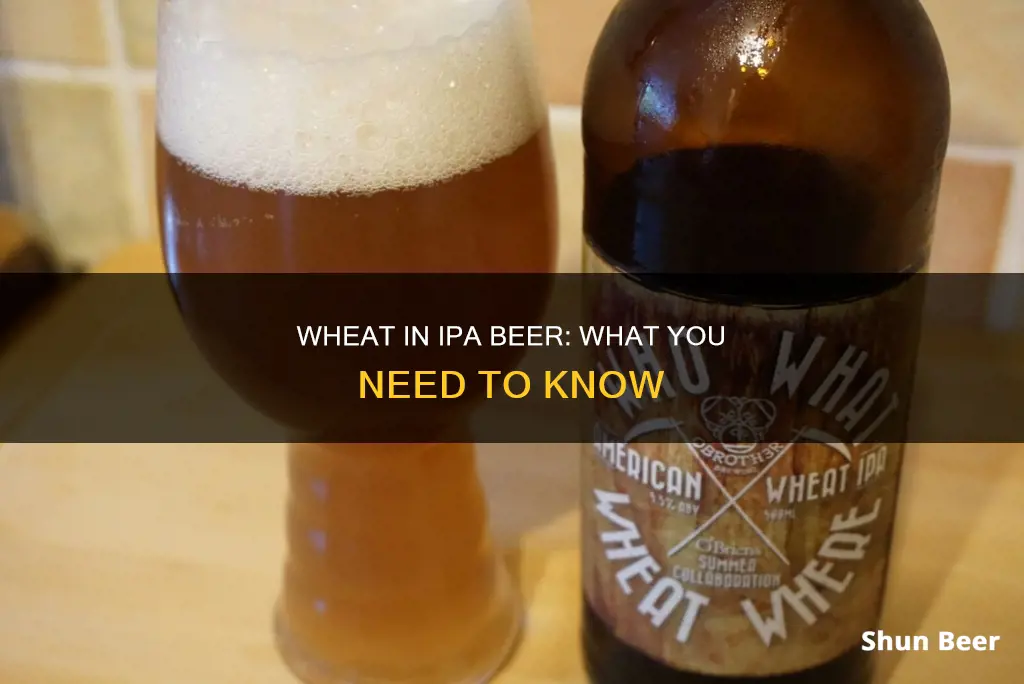
Wheat beers are known to give the beverage a foamy head and a fuller body. Wheat also contains more proteins, namely gluten, that are believed to enhance mouthfeel, improve foam stability, and lead to a hazy appearance in the finished beer. While barley is the most common grain used in beer, wheat has been used for centuries to create unique styles such as Hefeweizen and Witbier. Wheat IPA is a popular hybrid beer style that blends the hoppiness of an IPA with the Belgian characteristics of white ales. However, it is important to note that wheat beers are not gluten-free, and individuals with gluten intolerance or celiac disease should avoid consuming them.
| Characteristics | Values |
|---|---|
| Does IPA beer have wheat in it? | It depends on the type of IPA. While some IPAs like the White IPA contain wheat, others do not. |
| Gluten in IPA beer | All beer by definition has gluten. However, some beers are made to be gluten-reduced or gluten-free. |
| Wheat in beer | Wheat is often used in brewing and is known to possess more diastatic power than most other malted grains. It is said to give the beer a foamy head and a fuller body. |
What You'll Learn

IPAs can be made with wheat
One popular hybrid beer style is the white IPA, which blends the hoppiness of an IPA with the Belgian characteristics of white ales. For instance, the Honeyspot Road by Two Roads Brewing Company uses 30% unmalted wheat in the grist bill, providing a classic wheat flavour and an additional layer of earthy flavour and a rounded mouthfeel. The wheat also helps to stabilize haze in the finished product.
Wheat IPAs can also be made at home. Brewer Mark Medlin of Sweetwater Brewing Company in Atlanta, Georgia, recommends a simple malt bill of 2-row, wheat, and oats for brewing a white IPA. According to Medlin, wheat can be as much as 10-50% of the malt bill, depending on the type of white IPA being brewed.
While barley is the most common cereal grain used in beer, wheat has been used for centuries to create unique styles such as Hefeweizen and Witbier, which feature a significant amount of wheat.
The Longevity of White Wheat Beers Explored
You may want to see also

Barley is the most common grain in beer
Beer is a fermented alcoholic drink made using cereal grains. While several grains can be used, barley is the most common. In fact, 30% of the world's barley production is used as a source of fermentable material for beer.
Barley is a type of grass that was first cultivated around 9000 BC in the Fertile Crescent, an area of relatively abundant water in Western Asia. It was one of the first grains to be domesticated, giving it nonshattering spikelets and making it much easier to harvest. From there, its use spread throughout Eurasia by 2000 BC.
Barley is a key ingredient in beer because it contains starch, which can be converted into sugar during the malting process. This involves taking a bath in hot water, which causes the grain to create enzymes that transform its proteins and starches into fermentable sugars. These sugars are then consumed by yeast, which produces alcohol.
Barley is also important in brewing because its husks keep the mash (the grains steeped in boiling water) loose and allow for the drainage of the wort (the broth that becomes beer). Additionally, barley can be blended with other grains, such as rye and wheat, to create unique flavours and characteristics in the final beer.
While barley is the most common grain used in beer, other grains such as wheat, rice, oats, rye, corn, sorghum, and millet have also been used throughout history to create different styles of beer.
Dark Beers and Wheat: What's the Connection?
You may want to see also

Gluten-free beers exist
Gluten-free beers have a different taste profile from regular beers due to the grains used. Early gluten-free beers often used sorghum, but brewers have moved away from this ingredient because of its sour flavor. Now, gluten-free brewers make flavorful ales, Belgian whites, and IPAs using creative ingredients and other gluten-free grains.
Some breweries are dedicated gluten-free breweries, meaning they do not handle gluten-containing ingredients at all. Gluten-free beers are regulated by the Food and Drug Administration (FDA) and, according to FDA regulation, must contain less than 20 parts per million (ppm) of gluten.
- Buck Wild Pale Ale by Alpenglow Beer Company (California, USA)
- Glutenberg Blonde Ale by Glutenberg
- Redbridge Lager by Anheuser-Busch (Missouri, USA)
- BuckWit Belgian by Holidaily Brewing Co. (Colorado, USA)
- ALT Brew Copperhead Copper Ale by ALT Brew
- Roasted Coffee Ale by Burning Brothers (Minnesota, USA)
- Aurochs Session IPA by Aurochs Brewing
- Grand India Pale Ale by Green’s Beers (UK)
- Delicious IPA by Stone Brewing (California, USA)
- Grapefruit IPA by Ghostfish Brewing Company (Washington, USA)
Cobra Beer: Wheat-Free or Not?
You may want to see also

Gluten is a protein found in wheat
India pale ales (IPAs) are a type of beer, and beer is typically made with barley, which contains gluten. Gluten is a protein found in wheat, barley, and rye. It acts as a binder, giving dough its elasticity and stretchy quality. Without gluten, dough would easily rip, and baked goods would be too dry, crumbly, or dense. Gluten also helps retain moisture and prevents baked goods from becoming too crumbly.
In addition to wheat berries, spelt, durum, emmer, semolina, farina, farro, graham, khorasan wheat, einkorn, and triticale (a blend of wheat and rye) contain gluten. Oats, while naturally gluten-free, often come into contact with gluten during growth or processing. Gluten is also present in certain medications, personal hygiene products, and processed foods as a thickening or binding agent.
While gluten is safe for most people, some individuals with medical conditions such as celiac disease or non-celiac gluten sensitivity must avoid it. Celiac disease is an autoimmune disorder where gluten triggers the immune system to attack the small intestine, leading to malnutrition and other serious health issues. Non-celiac gluten sensitivity exhibits similar symptoms without the presence of antibodies or intestinal damage. Wheat allergy is another condition where the body reacts to one or more wheat proteins, with symptoms ranging from mild to severe.
For those who can tolerate gluten, it is not unhealthy and may even provide benefits. Whole-grain consumption, including wheat, has been linked to improved health outcomes. Gluten may also act as a prebiotic, feeding the good bacteria in the human gut. However, for those with gluten intolerance or sensitivity, it is essential to follow a strict gluten-free diet to prevent adverse health effects.
Wheat Beers: Are All Brews Created Equal?
You may want to see also

Beers can be made with other grains
Beer is typically made with barley, which is the base of the drink. However, other grains can be used to create unique styles of beer. Wheat, for example, is used to create a fuller body and mouthfeel, as well as a foamy head. It is also used to create a smooth and hazy brew. While wheat is often used in beer, it is not a necessary ingredient, and there are several other grains that can be used in its place.
Oats are one such alternative grain. They are used in combination with barley to create a creamy and full-bodied brew that is smooth and balanced. Like wheat, oats add to the body and head retention of the beer, but they also contribute to the colour, aroma, and flavour. Beers made with oats often have notes of coffee, chocolate, biscuits, and caramel.
Another grain that can be used in beer is rice. Unlike wheat, rice does not pass on much taste to the beer. Instead, it helps to create bitter flavours and a dry profile. It also lightens the body of the beer, decreases haziness, and balances flavours.
Rye is also used in beer, often in combination with barley. It sharpens and adds complexity to the flavours, as well as crispness and spiciness.
In addition to these grains, corn is sometimes used in beer. It brings a smooth and neutral sweetness to the brew, lightens the body, decreases haziness, and balances flavours.
While barley and wheat are common ingredients in beer, they are not the only options. Brewers can get creative and use a variety of different grains, each of which contributes its own unique characteristics to the final product.
Wheat Beers: Malt-Forward Brews Explained
You may want to see also
Frequently asked questions
Yes, some IPAs contain wheat. Wheat is often malted for brewing and is known to possess more diastatic power than most other malted grains. Wheat also contains more proteins, namely gluten, that are believed to enhance mouthfeel, improve foam stability, and lead to a hazy appearance in the finished beer.
Wheat beer is a style of beer that features a hefty dose of wheat, while IPA is a style of beer with more hops than regular ales. Wheat beers typically have a foamy head and a fuller body, while IPAs are known for their bitterness and high alcohol content.
No, people with gluten intolerance should avoid drinking IPA beer as it contains gluten. However, there are gluten-free options available that are made with alternative grains or use enzymes to break down the gluten proteins.







